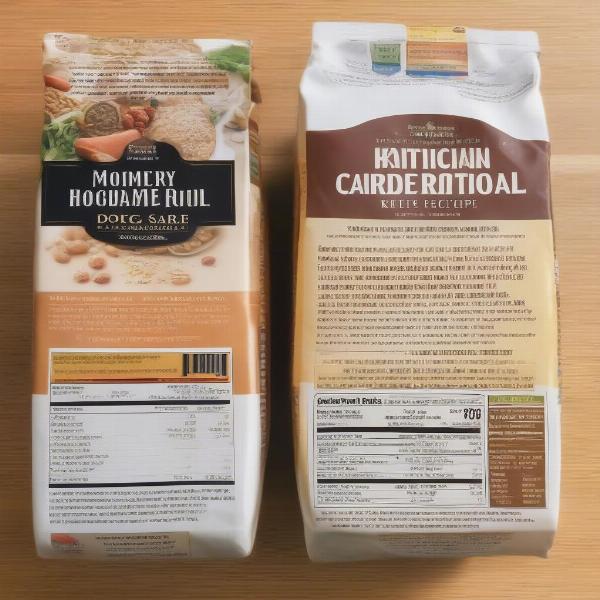Kidney failure in dogs is a serious condition that requires careful management, with diet playing a crucial role. Choosing the right dog food for kidney failure can significantly impact your dog’s quality of life. This comprehensive guide will explore the key factors to consider when selecting the best dog food for your furry friend with kidney issues.
Understanding the Role of Diet in Canine Kidney Failure
When a dog’s kidneys fail, they struggle to filter waste products and excess fluids from the bloodstream effectively. This leads to a buildup of toxins, which can cause various symptoms like nausea, vomiting, and lethargy. A specialized dog food for kidney failure is designed to minimize the workload on the kidneys by reducing the amount of waste they have to process. This is typically achieved by controlling levels of phosphorus, protein, and sodium.
Key Nutritional Factors in Dog Food for Kidney Failure
Choosing the right dog food for kidney failure involves focusing on key nutritional elements. Phosphorus control is crucial as elevated levels can worsen kidney damage. Protein should be of high quality but restricted to reduce the workload on the kidneys. Sodium restriction helps manage blood pressure and fluid retention. Additionally, supplementing omega-3 fatty acids can have anti-inflammatory benefits.
Phosphorus
High phosphorus levels in the blood contribute to further kidney deterioration. Therefore, dog food for kidney failure should be low in phosphorus.
Protein
While protein is essential, excessive amounts can strain the kidneys. Kidney-friendly dog food contains moderate levels of high-quality protein to support muscle mass without overburdening the kidneys.
Sodium
Reducing sodium intake helps manage blood pressure and minimizes fluid retention, which are common concerns in dogs with kidney failure.
Omega-3 Fatty Acids
Omega-3 fatty acids, particularly EPA and DHA, possess anti-inflammatory properties that can be beneficial for dogs with kidney disease.
 Comparing different kidney care dog food labels
Comparing different kidney care dog food labels
Choosing the Right Dog Food: Commercial vs. Homemade
Deciding between commercial and homemade diets requires careful consideration. Commercial dog food for kidney failure offers convenience and consistent nutrient profiles, ensuring your dog receives the necessary balance. Homemade diets allow for greater control over ingredients but require meticulous planning and balancing to avoid nutritional deficiencies. Consulting with a veterinary nutritionist is highly recommended for homemade diets.
Transitioning to a New Diet
When transitioning to a new dog food for kidney failure, gradual introduction is essential to avoid digestive upset. Start by mixing a small amount of the new food with the old, gradually increasing the proportion of the new food over 7-10 days. Monitor your dog for any signs of digestive issues, such as vomiting or diarrhea.
Monitoring Your Dog’s Progress
Regular veterinary check-ups are crucial for monitoring kidney function and adjusting the diet as needed. Your veterinarian will assess your dog’s blood work and recommend any necessary changes to the diet or medication.
Conclusion
Choosing the right dog food for kidney failure is a vital step in managing this challenging condition. By understanding the key nutritional factors and working closely with your veterinarian, you can help your dog maintain a good quality of life. Remember, a properly balanced diet is crucial for supporting kidney function and minimizing the progression of the disease.
FAQ
- What are the signs of kidney failure in dogs? Increased thirst and urination, loss of appetite, vomiting, weight loss, and lethargy.
- Can kidney failure be cured in dogs? Unfortunately, kidney failure is not curable, but it can be managed with appropriate treatment, including diet and medication.
- How long can a dog live with kidney failure? This varies depending on the severity of the disease and the individual dog, but with proper management, dogs can live for months or even years after diagnosis.
- Is dry or wet food better for dogs with kidney failure? Both dry and wet food can be suitable, but wet food may be beneficial for dogs who are dehydrated or have reduced appetite.
- Are there any treats I can give my dog with kidney failure? Consult your veterinarian for recommendations on appropriate treats that are low in phosphorus, protein, and sodium.
- What is the importance of regular blood work for dogs with kidney failure? Regular blood work helps monitor kidney function, electrolyte balance, and overall health, allowing for timely adjustments to the treatment plan.
- What are the alternatives to commercial kidney diets for dogs? Homemade diets can be an alternative, but they require careful planning and veterinary guidance to ensure nutritional balance.
Related Articles
About ILM Dog
ILM Dog is your trusted global resource for expert advice on dog care and nutrition. We provide comprehensive information on various aspects of dog ownership, including breed selection, health and medical care, training, nutrition, grooming, and much more. Whether you’re a new dog owner or a seasoned expert, ILM Dog offers valuable insights to help you provide the best possible care for your canine companion. We are committed to helping you make informed decisions about your dog’s health and well-being. Contact us via email at [email protected] or phone at +44 20-3965-8624. For more information, visit ILM Dog.